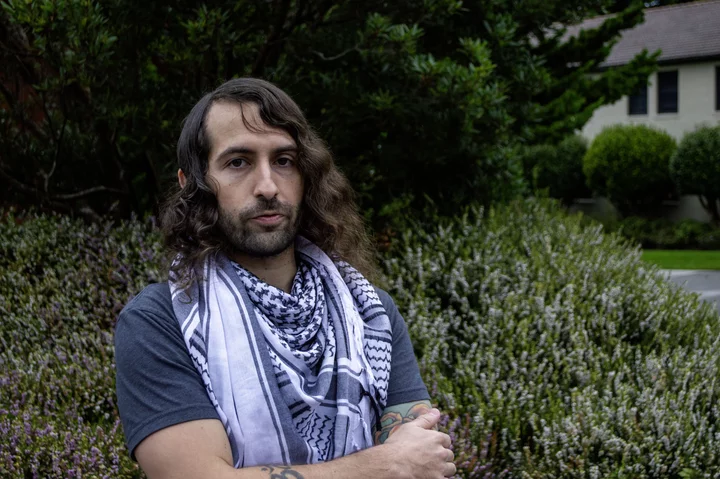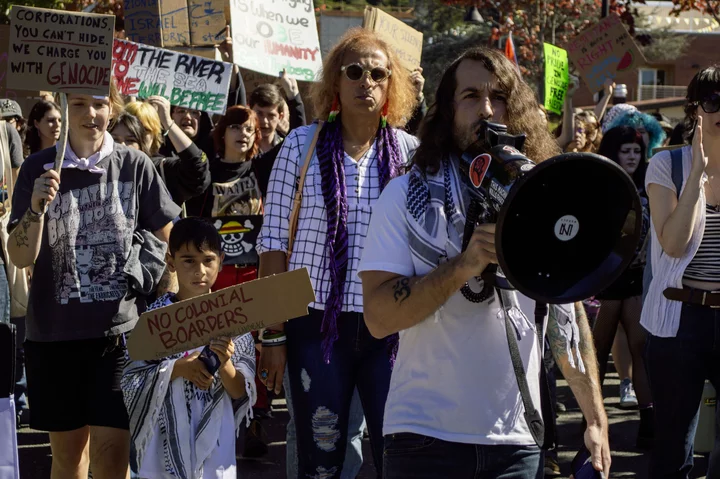Toledo this morning standing in the main quad.
PREVIOUSLY
Cal Poly Humboldt unfairly targets pro-Palestine activists by weaponizing their Time, Place, and Manner (TPM) policy on free speech against them, claimed student organizer Rick Toledo at an informal press conference on CPH’s campus this morning. It was followed by a protest attended by a few dozen students supporting him.
Toledo, 33, is a grad student in CPH’s engineering and community practice program and also one of the main organizers for Humboldt’s Students for a Democratic Society chapter. He timed the conference an hour before a disciplinary meeting with CPH administrators for violating their TPM rules; Toledo was one of the planners central to the Oct. 7 pro-Palestine march on campus several weeks ago. They did not get permission from CPH to host the rally.
According to a letter sent to Toledo by the university’s Office of Student Rights & Responsibilities, Toledo is accused of disobeying a university officer and “substantial disruption” of a university-related activity and CPH’s normal operations.
He said he wasn’t scared of being expelled, but does want the charges dropped.
This isn’t the first time Toledo has chafed against the school’s TPM restrictions. In Jan. 2024, when he was an undergrad, Toledo and a crowd of student activists interrupted a university-sponsored meeting for potential donors attended by then-president Tom Jackson, chanting with a megaphone outside an art department building. Both Toledo and another protestor received deferred probations for violating the rules against amplified speech and unpermitted organizing.
Toledo leading the Oct. 7 march that got him in hot water with Cal Poly Humboldt.
Toledo’s list of grievances with the university vis-à-vis their relationship with student activists is long. He feels that the university targets pro-Palestine groups more than other activist organizations, doesn’t do a good job compromising with them, and never changes despite the opposition; and he thinks the TPM policy is too restrictive and turns public property into an overly-regulated “business”-like space, devoid of the possibility of spontaneous demonstration (and doesn’t work to protect other students anyway).
Though he admits that the protest broke the rules and may have annoyed other students with the noise or political messaging, Toledo thinks it was justified. Campus protests aren’t frequent enough to truly have a negative impact, he said, and the issues at stake are important enough to warrant a little chaos.
“Protest is meant to be disruptive, and it’s usually a response to a greater issue that’s not being addressed,” Toledo said this morning. “…The thing that makes it most impactful and powerful is if they can just show up spontaneously and do that thing, or if they can just call people in and make it happen pretty immediately.”
CPH said in a statement sent to the Outpost today that it supported student free speech, so long as it was respectful and rule-following.
Cal Poly Humboldt has a longstanding and unwavering commitment to protecting free speech and the constitutional rights of all members of our campus community. We strongly support students’ right to engage in peaceful protest, advocacy, and expression of diverse viewpoints. These rights are fundamental to the mission of higher education and to the vibrant exchange of ideas that defines our university.
Recent protests on our campus demonstrate the engagement and passion of our student body on important social issues. While all recent free speech activities on campus have been peaceful, not all policies relating to Time, Place, and Manner were observed, and the University strives to ensure those policies are upheld in order to ensure free speech is protected for all.
While we cannot comment on the specifics of any specific student conduct matter, we want to be absolutely clear about the purpose and nature of any conduct proceedings we initiate in relation to free speech activities.
No student is disciplined for exercising their First Amendment rights to protest or for the content of their speech. Our Student Conduct Code explicitly prohibits disciplinary action against students based on behavior protected by the First Amendment, and we take this obligation seriously.
As a matter of policy and in accordance with the Family Educational Rights and Privacy Act (FERPA), we do not comment on specific student conduct cases. However, broadly speaking, disciplinary action related to a Student Code of Conduct violation wouldn’t result in criminal charges unless the law is broken. Most often, disciplinary action results from a violation of University policy. Depending on the situation, conduct cases typically don’t end in suspension or expulsion.
The process of investigating a possible violation of the Student Code of Conduct policy begins with informal discussions between the Office of Student Rights & Responsibility and the student to help the student understand why a policy may have been violated and to better understand the student’s perspective of the incident in question.
The University’s process for investigating student conduct violations is a trauma-informed approach that takes into account the life experiences that may have influenced the student’s decisions. Our goal is to provide educational and well-being support and resources that a student may need to thrive at Cal Poly Humboldt, guide them in future decision-making, and ensure policies are understood and followed from that point forward.
We encourage students with concerns about these or any other topics to reach out to the Dean of Students’ office at 707-826-3504 or dos@humboldt.edu.
For extra background on Toledo, check out this profile I wrote for the Lumberjack student newspaper in 2024.


CLICK TO MANAGE